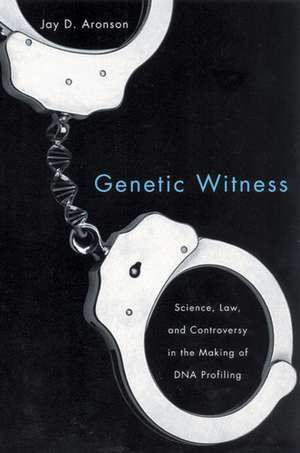Genetic Witness: Science, Law, and Controversy in the Making of DNA Profiling
Autor Jay D. Aronsonen Limba Engleză Paperback – 11 oct 2007
When DNA profiling was first introduced into the American legal system in 1987, it was heralded as a technology that would revolutionize law enforcement. As an investigative tool, it has lived up to much of this hype—it is regularly used to track down unknown criminals, put murderers and rapists behind bars, and exonerate the innocent.
Yet, this promise took ten turbulent years to be fulfilled. In Genetic Witness, Jay D. Aronson uncovers the dramatic early history of DNA profiling that has been obscured by the technique’s recent success. He demonstrates that robust quality control and quality assurance measures were initially nonexistent, interpretation of test results was based more on assumption than empirical evidence, and the technique was susceptible to error at every stage. Most of these issues came to light only through defense challenges to what prosecutors claimed to be an infallible technology. Although this process was fraught with controversy, inefficiency, and personal antagonism, the quality of DNA evidence improved dramatically as a result. Aronson argues, however, that the dream of a perfect identification technology remains unrealized.
Yet, this promise took ten turbulent years to be fulfilled. In Genetic Witness, Jay D. Aronson uncovers the dramatic early history of DNA profiling that has been obscured by the technique’s recent success. He demonstrates that robust quality control and quality assurance measures were initially nonexistent, interpretation of test results was based more on assumption than empirical evidence, and the technique was susceptible to error at every stage. Most of these issues came to light only through defense challenges to what prosecutors claimed to be an infallible technology. Although this process was fraught with controversy, inefficiency, and personal antagonism, the quality of DNA evidence improved dramatically as a result. Aronson argues, however, that the dream of a perfect identification technology remains unrealized.
Preț: 292.67 lei
Nou
Puncte Express: 439
Preț estimativ în valută:
56.00€ • 59.89$ • 46.69£
56.00€ • 59.89$ • 46.69£
Carte tipărită la comandă
Livrare economică 17 aprilie-01 mai
Preluare comenzi: 021 569.72.76
Specificații
ISBN-13: 9780813541884
ISBN-10: 0813541883
Pagini: 288
Ilustrații: 8
Dimensiuni: 152 x 229 x 18 mm
Greutate: 0.46 kg
Ediția:None
Editura: Rutgers University Press
Colecția Rutgers University Press
ISBN-10: 0813541883
Pagini: 288
Ilustrații: 8
Dimensiuni: 152 x 229 x 18 mm
Greutate: 0.46 kg
Ediția:None
Editura: Rutgers University Press
Colecția Rutgers University Press
Notă biografică
Jay D. Aronson is an assistant professor of history at Carnegie Mellon University in Pittsburgh, Pennsylvania.
Cuprins
Science for hire
DNA on trial
Challenging DNA
Public science
The DNA wars
The debate in Washington
The DNA wars are over
The legacy of history
DNA on trial
Challenging DNA
Public science
The DNA wars
The debate in Washington
The DNA wars are over
The legacy of history
Recenzii
"Thorough and detailed, Aronson's work will be the definitive treatment of the recent history of DNA typing."
Descriere
When DNA profiling was first introduced into the American legal system in 1987, it was heralded as a technology that would revolutionize law enforcement. As an investigative tool, it has lived up to much of this hype—it is regularly used to track down unknown criminals, put murderers and rapists behind bars, and exonerate the innocent.
Yet, this promise took ten turbulent years to be fulfilled. In Genetic Witness, Jay D. Aronson uncovers the dramatic early history of DNA profiling that has been obscured by the technique’s recent success.
Yet, this promise took ten turbulent years to be fulfilled. In Genetic Witness, Jay D. Aronson uncovers the dramatic early history of DNA profiling that has been obscured by the technique’s recent success.














